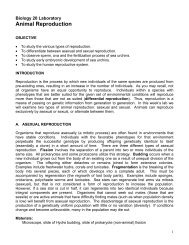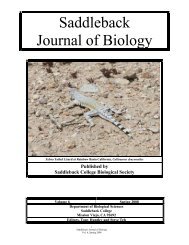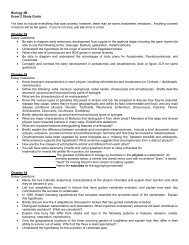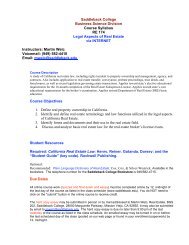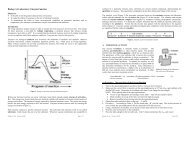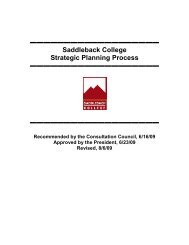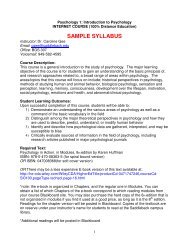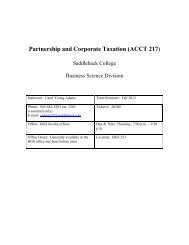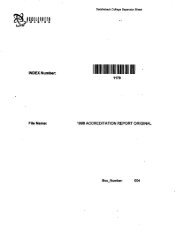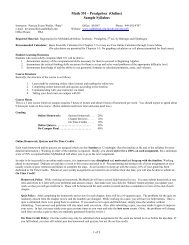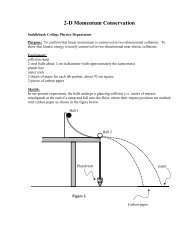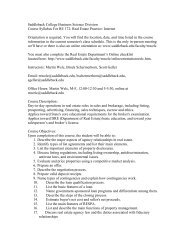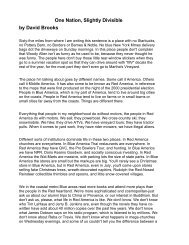Saddleback Journal of Biology - Saddleback College
Saddleback Journal of Biology - Saddleback College
Saddleback Journal of Biology - Saddleback College
Create successful ePaper yourself
Turn your PDF publications into a flip-book with our unique Google optimized e-Paper software.
Fall 2009 <strong>Biology</strong> 3B Paper<br />
Comparison <strong>of</strong> Water Versus Gatorade Hydration on VO 2 max and Maximal Exercise<br />
Time in Athletes<br />
Brennan Buchan and Kristin Fiore<br />
Department <strong>of</strong> Biological Science<br />
<strong>Saddleback</strong> <strong>College</strong><br />
Mission Viejo, CA 92692<br />
Excessive sweating and loss <strong>of</strong> water can cause dehydration during exercise. It is<br />
vital for athletes to replenish the water and electrolytes lost through sweat in order to avoid<br />
low blood pressure and plasma volume. This leads to elevated heart and respiration rates,<br />
low endurance, and overheating. Sports drinks, such as Gatorade, replenish lost water,<br />
and provide electrolytes and carbohydrates to athletes. However, it was predicted that<br />
there would be no difference between VO2max (ml/kg/min) and maximal exercise time<br />
(seconds) <strong>of</strong> athletes when hydrating with water versus Gatorade for a short, sustained<br />
period <strong>of</strong> time. After having 5 males, who exercise regularly, bike for a short duration no<br />
significant difference was found (p=0.911) between their VO2max with water hydration<br />
(2588.2270.2) versus Gatorade (2639.6351.4). Also, no significant difference was found<br />
(p=0.311) between the maximal exercise time (sprint time) with water (21.67.6) versus<br />
Gatorade (31.85.4) hydration.<br />
Introduction<br />
Gatorade is used by many athletes to increase<br />
stamina when exercising, under the assumption that it<br />
will produce better results than water. Hydration is<br />
necessary with any kind <strong>of</strong> exercise. Proper hydration<br />
and nutrients increase endurance, lower sub-maximal<br />
exercise heart rate, and reduce fluid loss (Duvillard et<br />
al, 2004). The heat produced by working muscles<br />
exceeds the heat released by the body causing overall<br />
body temperature to rise when exercising. This<br />
increase in temperature causes an increase in sweating<br />
and blood flow to the skin. This results in heat being<br />
removed by the evaporation <strong>of</strong> sweat from the skin,<br />
radiated from the body to the cooler surroundings, and<br />
lost by convection to moving air. A heavy sweat<br />
producer can potentially lose more than 2.84 liters <strong>of</strong><br />
sweat during each hour <strong>of</strong> exercise, meaning<br />
dehydration can develop very quickly (Bergerson,<br />
2006). Due to this need for effective hydration, athletic<br />
drinks contain carbohydrates and electrolytes that<br />
should re-hydrate the body more effectively than<br />
water. Sports drinks such as Gatorade also contain<br />
sodium, which helps promote responsive muscle<br />
contraction and the necessary water retention (Smith,<br />
1992). Smith’s study (1992) states that Gatorade has<br />
ingredients to quench thirst and replenish lost<br />
electrolytes, which aids in athletic endurance and fluid<br />
retention. This makes it a logical choice for hydrating<br />
before and during exercise.<br />
VO2max is the maximum ability <strong>of</strong> an<br />
individual’s body to utilize oxygen during maximal<br />
exercise. It is commonly used to determine the<br />
endurance <strong>of</strong> athletes and their relative fitness. By<br />
comparing both the level <strong>of</strong> VO2max an athlete<br />
achieves and how long they can maintain it, athletic<br />
fitness and endurance can be easily studied.<br />
The objective <strong>of</strong> this study is to determine<br />
how an athlete’s endurance level, as illustrated by<br />
VO2max and their time at maximal exercise, is<br />
affected by drinking water versus drinking Gatorade<br />
before exercise. The experiment will compare how<br />
each drink affects the athletic performance <strong>of</strong> 5 males,<br />
aged 18-20 who regularly exercise. It is expected that<br />
there will be no significant difference between each<br />
athlete’s VO2max and maximal exercise time when<br />
hydrated with water versus Gatorade.<br />
Materials and Methods<br />
A Jager Oxycon Mobile Respirometer was<br />
obtained from the Biological Sciences Department <strong>of</strong><br />
<strong>Saddleback</strong> <strong>College</strong> in Mission Viejo, California. 5<br />
males between the ages <strong>of</strong> 18-20, all <strong>of</strong> whom exercise<br />
regularly, were tested during a 45 minute period to<br />
measure their maximum volume <strong>of</strong> oxygen intake<br />
when hydrated by one <strong>of</strong> two substances: water or<br />
Gatorade. Testing took place in room 128 <strong>of</strong> the<br />
science and math building at <strong>Saddleback</strong> <strong>College</strong><br />
between the dates <strong>of</strong> November 5 th and November 20 th ,<br />
2009. During each testing period, the Oxycon unit was<br />
connected and to a laptop running LabPro, and warmed<br />
103<br />
<strong>Saddleback</strong> <strong>Journal</strong> <strong>of</strong> <strong>Biology</strong><br />
Spring 2010



